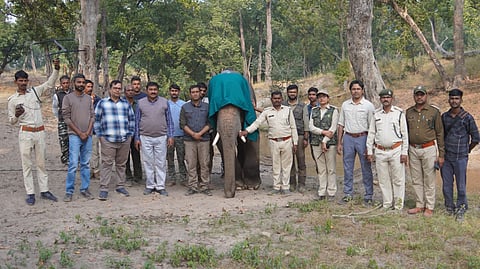

BHOPAL: In a first in the tiger and cheetah state, Madhya Pradesh, a wild elephant that accidentally trampled a man to death in March this year, has been radio-collared before being freed into the forests again.
Back in March, the wild male elephant got separated from its herd and strayed into the human settlements in the North Shahdol range of the Shahdol district of eastern MP. While straying into the human habitats, it accidentally trampled a man to death.
Subsequently, it was rescued by the staff of the Bandhavgarh Tiger Reserve (BTR) and housed at the reserve’s Elephant Camp along with other elephants.
“We’ve successfully collared the concerned wild elephant on November 20, before releasing it again in the wild. This is the first time an elephant has been radio-collared in Madhya Pradesh. It will help us meticulously monitor and study its ecology, track its movement, behaviour and home range,” state forest department’s additional principal chief conservator of forest (APCCF-Wildlife) L Krishnamurthy told this newspaper on Friday.
According to information from the Bandhavgarh Tiger Reserve (BTR) field director Anupam Sahai, the male elephant (aged between 12 and 15 years) after being radio-collared on November 20, has been released in the Damna jungles of the Reserve’s Tala Range and is being continuously monitored.
“In the first two days only, it has started associating with another male elephant (possibly of the same age), which too is moving alone, after getting separated from its herd,” Sahai added.
This latest and first-of-its-kind development in the state assumes particular significance as it happened within three weeks of the death of 10 wild elephants (nine of them females, including two pregnant jumbos) who formed part of a 13-strong herd moving in the jungles of the BTR.
“It will particularly enable us to study the elephant’s movement patterns, especially track whether it’s associating with any herd or not. The success of this move holds the potential of proper planning to prevent elephant-human conflicts in future, keeping in mind the rising population of wild elephants in the BTR and forests in adjoining districts of eastern MP, neighbouring Chhattisgarh,” Krishnamurthy added.
Depending on the success of this first of its kind move in MP, two more wild elephants, including a male which was rescued after getting separated from their herds in the past and a calf, will also be radio-collared, before being freed into the forests, particularly to monitor their movement and association with new herds.
“Success of these initiatives hold the key to our long-term future planning of radio collaring at least one member of each of the elephant herds, currently moving through the forests of the state,” the APCCF-Wildlife said.
Presently elephant herds are particularly active in jungles of districts neighbouring Chhattisgarh, including two tiger reserves, BTR and Sanjay Dubri Tiger Reserve, besides Umaria, Anuppur, Shahdol, Sidhi and Katni districts.
According to forest department sources, the BTR and adjoining areas, particularly, are witnessing maximum movement of elephants which number over 60. These elephants who migrated from neighbouring Chhattisgarh, have made BTR forests and adjoining areas their preferred habitat since 2018.